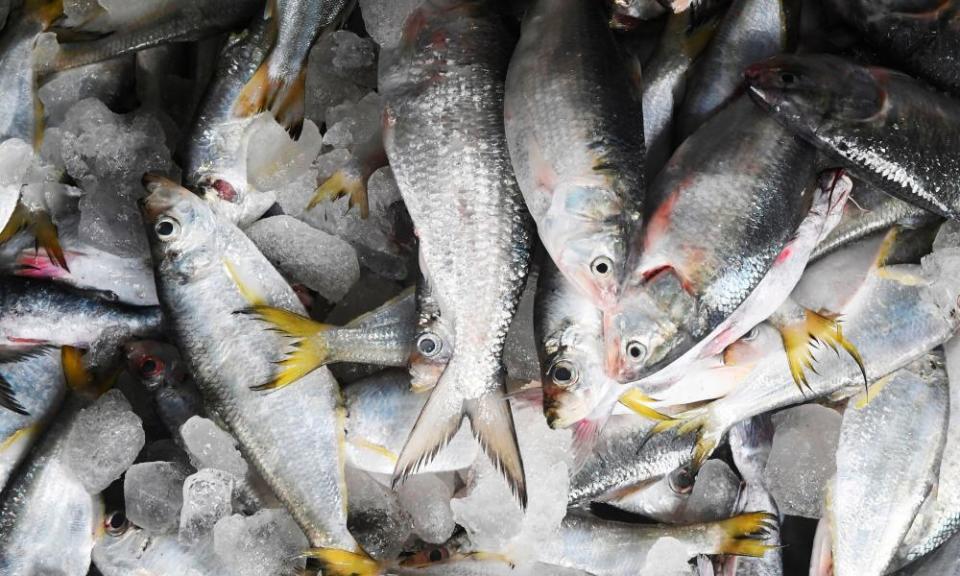‘We do not get a chance at happiness’: the Bangladeshi fishermen caught by debt

Kalam Sheikh’s life revolves around the few months when he goes in search of Bangladesh’s prized hilsa fish. When he gets a good catch, he can make enough money to live on for the rest of the year. He can pay off some of his debts and even improve his home.
But this fragile annual cycle has been broken this year, with bad catches bookended by months off the water by the coronavirus pandemic and government restrictions to stop overfishing.
With another pause in fishing for October’s hilsa breeding season, Sheikh and his colleagues are worried about plunging deeper into debt.
“If we get a good hilsa catch, we can live a good life for the rest of the year … we can afford work like repairing our houses … repaying loans, arranging marriages for our children – all from the income of hilsa season,” said Sheikh.
“I wanted to make up for the crisis of the coronavirus period by earning from the hilsa season. But this year the amount of hilsa is less. We are making a loss, so far, and the crisis looks set to get worse in the days ahead.”
On top of the usual loans he has to take out every year to buy fishing equipment and hire a boat, Sheikh was forced to borrow more money to meet his family’s needs during the Covid-19 lockdown.
The hilsa fish, which is usually found in the sea but seasonally migrates up rivers to breed, is prized in Bengali cuisine and culture, to the extent that similar shortages in India’s West Bengal have encouraged cross-border smuggling.
Almost 300,000 Bangladeshis are directly involved in catching hilsa and two million more are involved in the more lucrative business of transporting and selling the fish to consumers.
The fishermen, however, get little reward from their catch because they are forced to sell at low prices dictated by local wholesalers as a condition of the loans they provide to the fishermen.
“As you take money from me, you have to sell the fish at low price – these are the conditions between the wholesalers and the fishers,” said Atiqur Rahman, a researcher for fishery NGO World Fish.
He said banks usually do not loan to fishermen, forcing them to rely on local businessmen or wholesalers who easily grant loans, but at high interest rates and with stringent conditions.

Sheikh said he is not allowed to sell to anyone else as a condition of the loan, making it hard for him to earn enough money to ever fully pay off the debt, and tying him to the wholesaler for another year.
Bangladesh’s hilsa stocks had been depleted from more than 30 years of overfishing, until 2003 when periodic fishing bans and protected areas were introduced.
Rahman said the small operators often lose out because of illegal fishing by powerful local businessmen as well as overfishing in the Bay of Bengal.
The government is preparing to allocate more than 10,000 tons of rice to the fishermen to compensate for the restrictions, but the food is often not enough because they require an income to pay off their debts.
“We do not get a chance at happiness, even after suffering all our lives. These days of crisis never end and we die with debt,” said Bashir Uddin, 48, at a teashop built on stilts by the river in the coastal Bhola district.
Like Sheikh, Uddin had to take out a loan during the coronavirus lockdown to keep his family afloat.
As with many Bangladeshi fishermen, Uddin started as a boy to contribute to the family income.
“When other kids were busy playing, I would go fishing in the river. Many of my friends who I grew up with went to school. I did not have that opportunity,” he said.
Rahman said Bangladesh’s fishermen have essentially ended up in a generational trap, forever indebted and unable to afford school for their children, while increasingly frequent natural disasters regularly force them out of the water.
Related: Bay of Bengal: depleted fish stocks and huge dead zone signal tipping point
“It has become a rule that whoever is born into a fisherman’s family, he will be a fisherman,” said Rahman.
The problem, he said, is that most have no control over their own means, having to pay large chunks of their profit to creditors and boat owners, who demand a share despite having no role in the fishing.
“The fishers are becoming poorer and poorer but the people who are in the upper tiers of the field are becoming richer,” said Rahman.

 Yahoo Finance
Yahoo Finance 